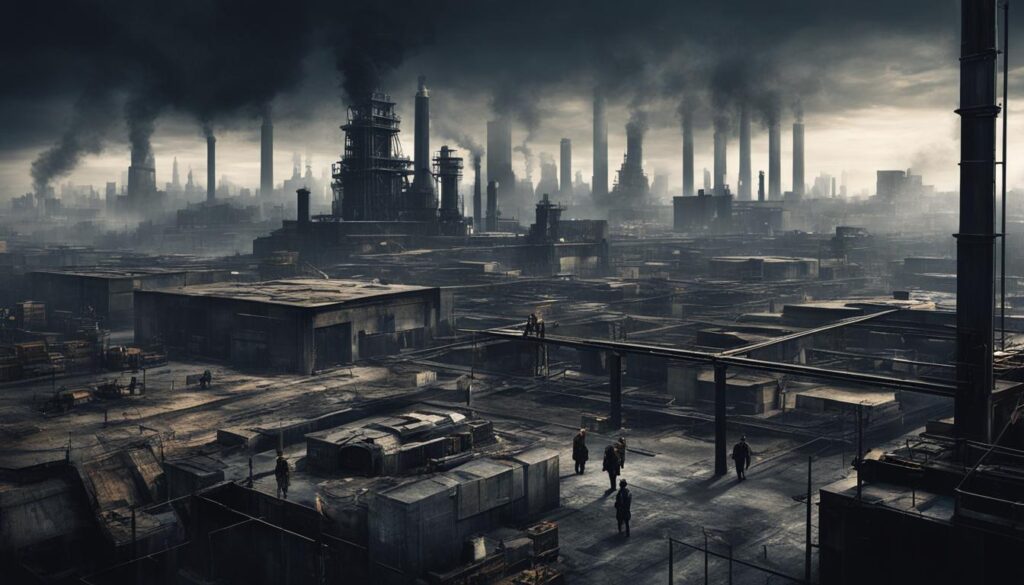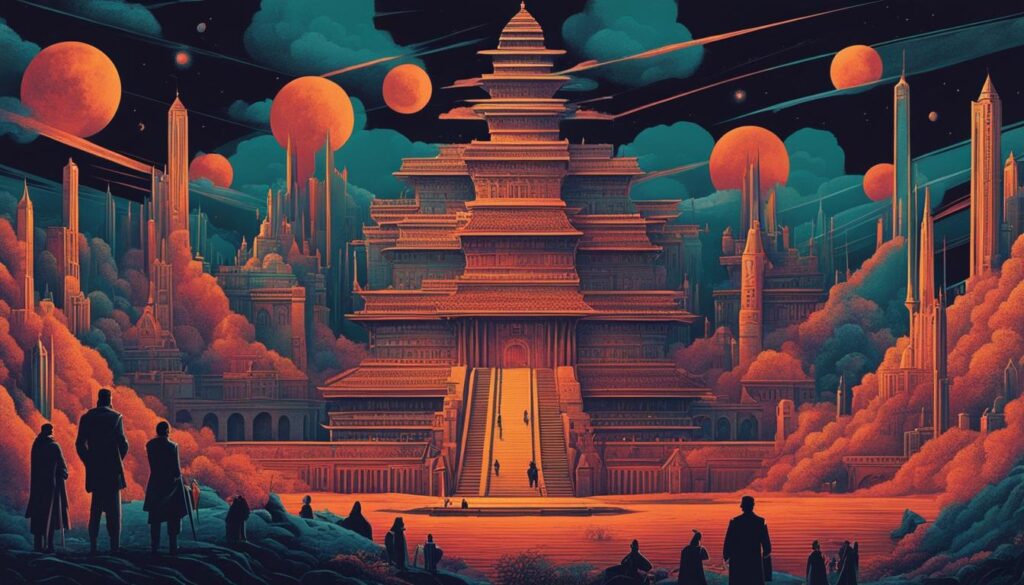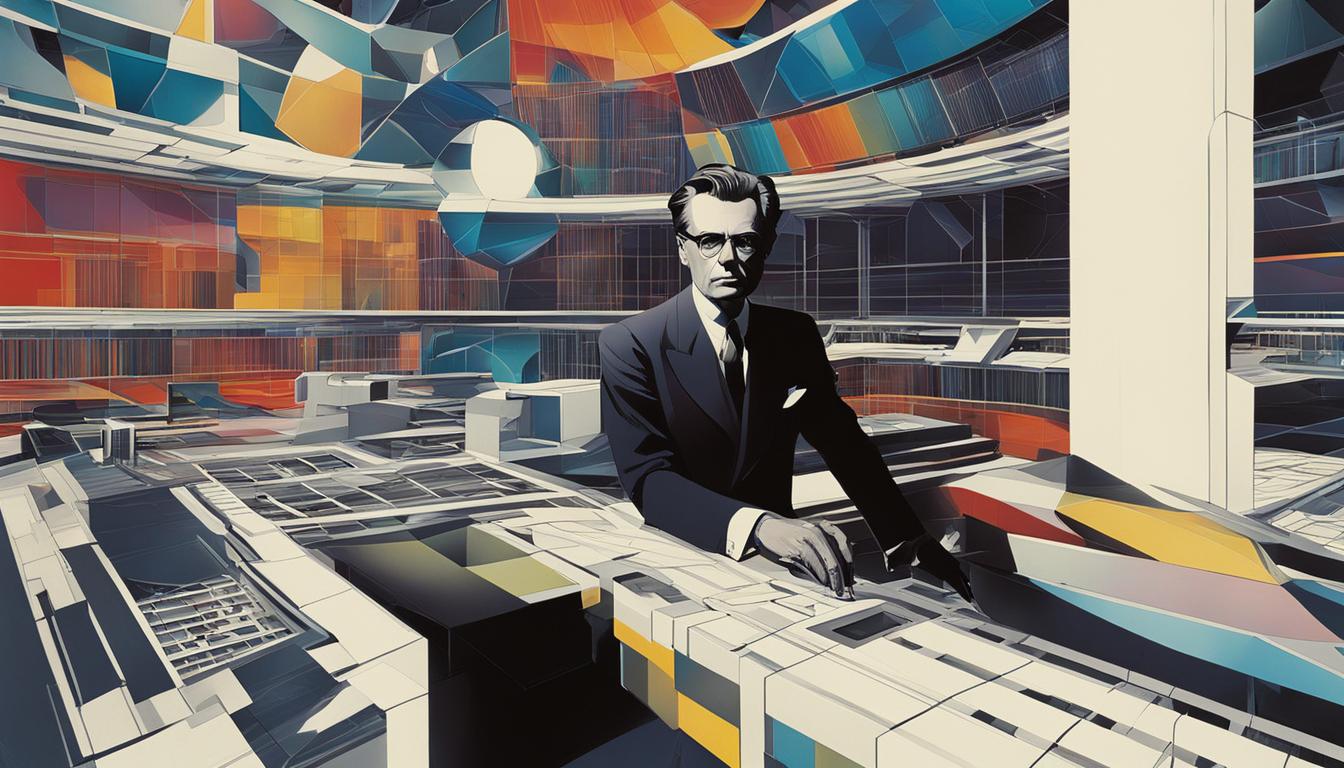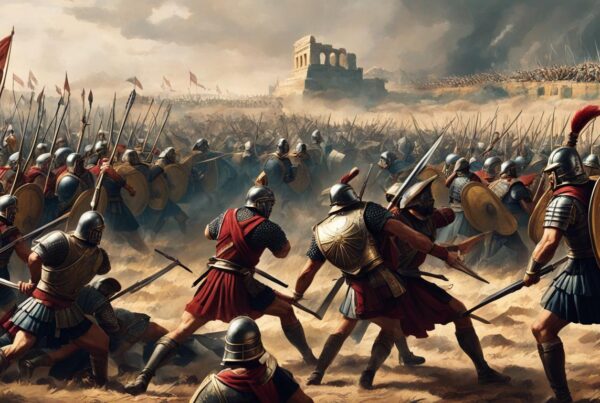Welcome to our audiobook review of “Brave New World” by Aldous Huxley, a timeless dystopian classic that continues to captivate audiences today. In this review, we will delve into the world crafted by Huxley and provide insightful analysis for interested listeners.
This audiobook review offers an in-depth look at the work of acclaimed author Aldous Huxley and his renowned piece of literature, “Brave New World.” We will explore the intricacies of the novel, including its themes, characters, and writing style. Our review will also delve into the historical and social relevance of Huxley’s work and provide a critical analysis of its impact on the literary world.
For those interested in experiencing this classic story in a new way, our audiobook review will examine the quality of the audiobook narration and production, offering a comprehensive evaluation of its production value.
Join us on this journey through “Brave New World” and discover the brilliance of Aldous Huxley’s imagination.
Introduction to “Brave New World”
Published in 1932, “Brave New World” by Aldous Huxley is hailed as a dystopian classic, exploring a society where genetic engineering and conditioning have created a rigid caste system, and individuality is discouraged. Huxley’s vision of a dark, totalitarian future continues to captivate readers today, inspiring numerous adaptations and works of fiction.
In “Brave New World,” the reader is transported to a world where pleasure and consumption are the highest values, and the existence of a stable society requires the suppression of free will and independent thought. The novel has been widely studied in literature courses and is revered for its commentary on social structure, individuality, and human nature.
As we will explore in this review, the themes of “Brave New World” are as relevant today as they were in Huxley’s time, inspiring critical analysis and reflection on our modern society. Join us as we delve deeper into this masterpiece of dystopian fiction.
Synopsis of “Brave New World”
In “Brave New World,” Aldous Huxley creates a society in which reproduction, social class, and emotions are artificially regulated. The novel centers around the lives of a few individuals, including Bernard Marx, a member of the social elite who feels alienated from his peers; John, an outsider from outside of the society who struggles to adapt to this new world; and Lenina Crowne, a woman who struggles to understand her own emotions.
The story begins in the Central London Hatchery and Conditioning Centre, where embryos are produced and conditioned for their specific role in society. Bernard Marx becomes fascinated by the outsider John, who was born naturally and has had a different upbringing. John, on the other hand, is fascinated by Lenina, and their budding relationship causes tension and conflict.
As the story progresses, we see the flaws and dangers of this society, including the loss of individuality, free will, and the true emotions that make us human. The novel is a warning against the dangers of scientific advancement and the desire for complete control over our lives.
The characters in “Brave New World” are complex and multi-dimensional, with their struggles and interactions reflecting the larger themes of the novel. Huxley’s writing and vivid descriptions create a vivid and haunting image of a future world, and the audiobook narration allows listeners to fully immerse themselves in the story.
Author Background: Aldous Huxley
Aldous Huxley was born on July 26, 1894, in Godalming, England. He came from a prominent family of intellectuals, including his grandfather, Thomas Henry Huxley, a biologist and proponent of Charles Darwin’s theory of evolution.
Huxley attended Eton College and then Balliol College, Oxford, where he studied English literature. He began his writing career as a journalist and went on to publish numerous novels, essays, and poems.
His literary works often explored themes of science, spirituality, and societal issues. He was a member of the literati group known as the Bloomsbury Group and counted fellow writers Virginia Woolf and D.H. Lawrence among his acquaintances.
Huxley is best known for his dystopian novel “Brave New World,” which explores a future society where people are controlled through science and technology. The novel has been widely acclaimed and is still studied in many schools today.
“The author’s life experiences and intellectual background add depth and credibility to his literary works, including the iconic ‘Brave New World’.”
Audiobook Narration and Production Value
When it comes to audiobooks, narration and production value play a crucial role in enhancing the overall listening experience. In the case of “Brave New World,” the narration by actor Michael York is top-notch, delivering a compelling performance that captures the essence of the novel’s dystopian world. His ability to convey different emotions and voices for various characters adds depth and nuance to the story, making it a truly immersive experience for listeners.
In terms of production value, the audiobook boasts high-quality sound, ensuring that every word is crystal clear without any distractions or background noises. The pacing and pauses are perfectly timed, allowing for a seamless story flow that keeps audiences engaged from start to finish.

Overall, the audiobook narration and production value in “Brave New World” meet and exceed expectations, making it a must-listen for fans of the genre.
Themes Explored in “Brave New World”
“Brave New World” portrays a society marked by the loss of individuality to satisfy the collective. The book’s themes reveal the chilling consequences of an unbridled embrace of technological advancement and an obsession with happiness.
The dystopian society of “Brave New World” is characterized by the degradation of human values in exchange for a false sense of contentment. The themes that contribute to this dystopian world include:
| Theme | Description |
|---|---|
| Dangers of a Dystopian Society | The book portrays the dangers of a society that values stability and conformity over the uniqueness of the individual. In this world, happiness is an illusion, and the government uses technology to control people’s emotions and thoughts. |
| Loss of Individuality | The society of “Brave New World” has eliminated individuality, and people are artificially born and conditioned to fit into their social class from birth. Characters are forbidden from expressing their unique identities, including their passions and emotions. |
| Dehumanization of Humanity | The book shows how the obsession with technology and conformity has dehumanized people to the point where they behave like machines. People in “Brave New World” are dissuaded from forming emotional connections or engaging in any meaningful human interaction. |
These themes reveal the dangers of devaluing individuality and speculating on the role of technology in society. Huxley’s masterpiece resonates with readers of all ages and provokes thoughtful analysis of these critical themes.
“The society of “Brave New World” has eliminated individuality, and people are artificially born and conditioned to fit into their social class from birth.”
Character Analysis in “Brave New World”
Throughout “Brave New World,” Aldous Huxley creates a cast of characters who play a pivotal role in conveying his message about the dangers of a dystopian society. Let’s take a closer look at some of the key characters and their significance.
| Character | Description | Role |
|---|---|---|
| Bernard Marx | A discontented member of society, Bernard harbors feelings of individuality and rebellion. | Provides a lens through which we can view the oppressive nature of society. |
| John the Savage | A man raised in a primitive society, John struggles to adjust to the ways of the World State. | Reflects the conflict between individuality and conformity in a world that values stability over all else. |
| Lenina Crowne | A conformist member of society, Lenina initially embodies the ideals of the World State. | Represents the dangers of a lack of individuality and the consequences of valuing pleasure over all else. |
| Mustapha Mond | A World Controller, Mond enforces the oppressive society on behalf of the government. | Exemplifies the dangers of too much power in the hands of a few, and highlights the consequences of unchecked authority. |
Each character in “Brave New World” serves a specific purpose in furthering Huxley’s critique of a society that values stability over individuality. Through their experiences and struggles, we gain valuable insights into the dangers of a dehumanized world, and the importance of fighting for our individuality and freedom.
The Role of Bernard Marx
Bernard Marx serves as a lens through which we can view the oppressive nature of the World State. As a character who feels out of place in conformist society, Bernard highlights the dangers of suppressing individuality. His quest for acceptance and meaning shows readers the consequences of valuing stability over all else, while his eventual downfall illustrates the risks of non-conformity in a society that values obedience and compliance over personal fulfillment.
The Significance of John the Savage
As a man born and raised outside of the World State, John the Savage embodies the conflict between individuality and conformity. His struggle to adjust to the ways of society underscores the dangers of a world that values stability over personal freedom and highlights the impact of dehumanizing technology. John’s resistance to society ultimately leads to his downfall, underscoring the consequences of resisting societal norms.
The Dangers of Lenina Crowne
Lenina Crowne initially embodies the ideals of the World State, fully embracing the conformity and pleasure that the society values. Her journey throughout the novel, however, shows readers the inherent dangers of a lack of individuality and the consequences of valuing pleasure over all else. Lenina’s inability to find true happiness highlights the importance of personal fulfillment, even in a society that shuns individuality.
Mustapha Mond and the Dangers of Authority
As a World Controller, Mustapha Mond exemplifies the dangers of too much power in the hands of the few. His actions highlight the risks of unchecked authority, and the consequences of a society that values state control over individual autonomy. Through his experiences, we see the dangers of conformity and the importance of fighting for individual liberties, even in the face of oppression.
Writing Style and Language
Aldous Huxley’s writing style in “Brave New World” is described as satirical and provocative, introducing readers to a rigid, dystopian society that deprives individuals of the very essence of humanity.
The author employs a straightforward, accessible language that conveys the world’s bleakness, emphasizing the deterioration of human values. The prose is remarkably creative and vivid, depicting a world where humans have been reduced to obeying the state’s orders blindly.
Huxley’s masterful use of imagery and symbolism further emphasizes the book’s message, with repeated references to Henry Ford and his assembly line philosophy, which associates human beings with machines. The author’s scathing commentary on society’s obsession with technology and the loss of individuality is a significant highlight of his writing style.
Historical and Social Relevance
Since its publication in 1932, “Brave New World” has remained a thought-provoking and influential dystopian classic. The novel’s themes of government control, genetic engineering, and the loss of individuality have continued to resonate with readers throughout the years. Huxley’s prediction of a society driven by consumerism has become a reality in the modern age, where technology and social media have made it easier than ever to manipulate and control the masses.
The novel’s historical relevance is rooted in the era in which it was written, particularly the rise of totalitarian regimes in Europe and the aftermath of World War I. Huxley’s critique of the dangers of a controlled state and the suppression of individual liberties reflects real-world events of his time.

The social relevance of “Brave New World” is also significant. The novel presents a warning about the dangers of sacrificing personal freedom and individuality in favor of societal efficiency and conformity. In a world where technology has made it easier than ever to manipulate and control individuals, the novel’s message remains particularly relevant.
Overall, “Brave New World” offers a cautionary tale about the dangers of sacrificing personal freedom and thought in the name of efficiency and conformity. Its historical and social relevance has ensured its continued relevance as a literary classic.
Impact and Influence of “Brave New World”
Since its publication in 1932, “Brave New World” has left an indelible impact on the literary world. The novel’s exploration of the dangers of a dystopian society and the loss of individuality continues to resonate with readers today.
Aldous Huxley’s cautionary tale has also served as a profound source of inspiration for authors, filmmakers, and other artists across genres. The themes and imagery of “Brave New World” have been adapted numerous times, cementing its influence on pop culture as well.
The novel’s powerful message has also sparked discussion and debate among scholars and critics. Its relevance to contemporary society, particularly in regard to technological advancements and the erosion of privacy, is indicative of the timeless nature of Huxley’s work.
The impact of “Brave New World” is undeniable, and it is a testament to the enduring power of literature to provoke thought and inspire change.
Comparison to Other Dystopian Novels
While “Brave New World” is undoubtedly a cornerstone of dystopian literature, there are other works that share similar themes and motifs. One such novel is George Orwell’s “1984,” which examines a totalitarian society in which free thought and individuality are systematically suppressed. In contrast, “Brave New World” explores the dangers of a society that places too much emphasis on pleasure and instant gratification, resulting in a loss of humanity and individuality.
Another notable dystopian work is “The Handmaid’s Tale” by Margaret Atwood, which examines a society in which women are stripped of their rights and treated as property. This novel shares similarities with “Brave New World,” as both explore the dangers of an oppressive and dehumanizing society.
“Brave New World” may be the most famous dystopian novel, but it is far from the only one to explore these themes. By comparing it to other works in the genre, we gain a greater understanding of its unique qualities and contributions to the dystopian canon.”
Critical Reception of “Brave New World”
Since its publication in 1932, “Brave New World” by Aldous Huxley has garnered significant critical attention. The novel’s dark portrayal of a dystopian society and its critique of technology and consumerism have resonated with readers and literary experts alike.
Writing for The Guardian, Margaret Atwood notes, “Huxley’s book is a compelling indictment of the dangers of science and technology when they are allowed to run unchecked for purely materialistic ends.”
Similarly, in his review for The New York Times, C.P. Snow writes, “Aldous Huxley’s new novel, ‘Brave New World,’ is a social and political satire, a science fiction of a highly ingenious sort, and a literary tour de force.”
“‘Brave New World’ is a social and political satire, a science fiction of a highly ingenious sort, and a literary tour de force.” – C.P. Snow, The New York Times
Despite some initial negative reviews, “Brave New World” has gone on to become a classic work of dystopian literature. It has been translated into numerous languages and adapted for film, television, and the stage.
The impact and relevance of “Brave New World” continue to be felt today, nearly a century after its initial publication. Its cautionary tale serves as a warning against the dangers of a society controlled by technology, consumerism, and conformity.
Personal Reflection and Interpretation
As avid fans of dystopian literature, we found “Brave New World” to be a thoroughly engaging and thought-provoking read. The vivid world that Huxley creates is simultaneously fascinating and terrifying, and the characters are complex and relatable in their own ways.
One theme that stood out to us was the loss of individuality and the dehumanization of society. The idea that everyone is genetically engineered and conditioned to fit into a specific social class is both disturbing and resonant, serving as a warning against the dangers of conformity.
We also appreciated Huxley’s use of satire and irony to highlight the flaws in the world he created. The way that technology is used to subjugate and control the population is a sobering reminder of the power of those in charge.
Overall, “Brave New World” is a classic that continues to be relevant today. It encourages us to question what we value as a society and to be wary of blindly accepting a world that is presented to us. We highly recommend this audiobook to anyone who enjoys dystopian literature or is looking for a thought-provoking listen.
Recommended Audience and Final Thoughts
After exploring the various components of “Brave New World” by Aldous Huxley in audiobook format, we recommend this book to a wide audience, especially those interested in classic dystopian literature and thought-provoking themes. The audiobook is a great choice for those who prefer to listen to books, and the narrator’s performance is highly engaging and adds depth to the already immersive story.
Overall, “Brave New World” is a timeless classic that continues to have relevance in today’s society. Its exploration of themes such as the dangers of a dystopian society and the loss of individuality is particularly poignant. We highly recommend this audiobook to anyone seeking an immersive and thought-provoking listening experience.
“Brave New World” is a hauntingly prophetic novel that continues to resonate with readers today, and the audiobook format only enhances its immersive experience.
Conclusion
In conclusion, “Brave New World” by Aldous Huxley is a timeless dystopian classic that continues to captivate readers and listeners alike. The audiobook narration and production value enhance the overall listening experience, while the thought-provoking themes and nuanced character analysis convey the author’s message with clarity and precision. The writing style and language used by Huxley adds to the book’s atmospheric quality, creating a vivid and haunting portrayal of a dehumanized society.
“Brave New World” remains historically and socially relevant, even decades after its initial publication, and its impact and influence can be seen in the numerous dystopian novels that followed. The critical reception of the book has been overwhelmingly positive, with many literary experts praising Huxley’s masterful storytelling and insightful commentary on human nature.
Overall, “Brave New World” is highly recommended for those interested in exploring the dangers of dystopian societies and the consequences of sacrificing individuality for the greater good. It is a thought-provoking and deeply impactful work that will stay with listeners long after the final chapter.



